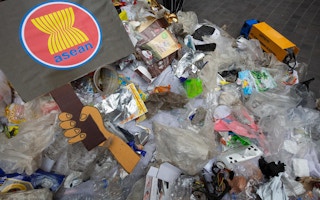Governments in Southeast Asia must tackle the root cause of plastic pollution by rolling out policies to cut the amount of single-use plastics produced, said environmentalists, even as they welcomed the latest pledge by regional leaders to combat marine debris.
To continue reading, subscribe to Eco‑Business.
There's something for everyone. We offer a range of subscription plans.
- Access our stories and receive our Insights Weekly newsletter with the free EB Member plan.
- Unlock unlimited access to our content and archive with EB Circle.
- Publish your content with EB Premium.
The framework adopted at the 34th Association of Southeast Asian Nations (Asean) Summit last weekend fell short of truly addressing the problem, said activists.
The Bangkok Declaration on Combating Marine Debris in Asean Region focuses more on waste management, but there is a need to cut production of single-use plastics so that they do not end up as waste, they said.
‘Ban plastic waste imports’
“Plastics is a pollution problem, not a litter problem, and must be addressed throughout its life cycle from production to end-of-life,” Greenpeace said in a statement on Monday.
Criticising the limited scope of the declaration, it repeated its call for Asean to immediately ban all imports of plastic waste, even those purportedly for recycling.
Since China stopped accepting recyclable plastic, unsorted scrap paper and other materials from abroad in January last year, much of the unwanted plastic has been channeled to Southeast Asian countries such as Malaysia, Vietnam and Thailand from places such as the United States, Japan, Germany and the United Kingdom.
According to data from the International Trade Centre, Asean’s plastic waste imports surged last year to more than 2.2 million tonnes, or 27 per cent of the global total, noted Greenpeace. This was up from 11 per cent of the global total in 2017, and just over 5 per cent in 2016.
Governments in the region have been fighting back. This year, Malaysia and the Philippines shipped back waste to their countries of origin. Thailand has said it intends to ban plastic waste imports by 2021, Malaysia has stopped issuing new permits for the import of plastic waste, and Vietnam has stopped issuing new licences for the import of waste and cracked down on illegal shipments.
Asean members should work together to enforce a region-wide ban on all plastic imports, Greenpeace urged.
Governments should also come up with laws to facilitate innovation on reusable packaging and product delivery systems. With growing amounts of domestic plastic waste, Asean countries should make companies accountable for their products and packaging by, for instance, making them responsible for post-consumer waste, the group said.
Sam Shuqin, co-founder of community group Our Singapore Reefs, said plastic items made up 68 per cent of marine debris retrieved in Singapore waters by its volunteer divers and other groups over the past five years. Other items retrieved and recorded are made of metal, glass, ceramic and other materials.
The top five types of marine debris are mainly single-use plastic items, said Sam. They include bottles, food wrappers, cutlery, caps and lids, as well as grocery or retail bags.
Ocean currents transport some trash across national boundaries, said Sam, who was encouraged by Asean’s vow to work together. “Some of the trash, especially the light types like plastic packaging, that we pick up do not seem to be from Singapore. However, we do come across bulky items like washing machines, bicycles and huge tyres which may seem too heavy for the currents to push… around.”
Higher business costs?
Under the Bangkok declaration, Asean countries agreed to “strengthen actions” to prevent and significantly reduce marine debris, particularly from land-based activities. They agreed to cooperate, share information and toughen national laws to encourage a “land-to-sea approach to prevent and reduce marine debris”.
Some analysts have, however, noted challenges in curbing the plastic waste scourge.
“Restriction over the use of single-use plastic products is likely to increase business costs and thus meet resistance from the business community, which may influence government policies,” noted Dr Lina Gong, a research fellow at the S Rajaratnam School of International Studies at Singapore’s Nanyang Technological University.
“For instance, while the Indonesian government started in 2018 drafting a regulation to tax plastic bags, the draft is still being debated by different ministries and the release is likely to be later than expected,” she wrote in a commentary in April titled More Plastic Bags than Fish? East Asia’s New Environmental Threat.
Reducing single-use plastic products and increasing recycling means having to change consumer habits, added Gong.
The public should know that biodegradable plastic can take many years to disintegrate or may require an industrial process to compost, and should not be thrown into the sea, said Sam.
Asean plays a key role in tackling ocean pollution. According to a 2015 study by the non-profit Ocean Conservancy and consulting firm McKinsey, about 60 per cent of the plastic waste dumped in the oceans comes from five countries in Asia: China, Indonesia, the Philippines, Vietnam and Thailand.
An estimated eight million tonnes of plastic waste leaks into the ocean every year, threatening marine life and the food chain.










